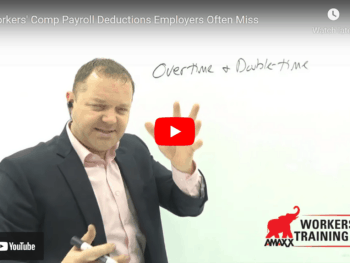Owner with No Employees Excludes Themselves From Workers Comp Coverage
When a small business owner does not have any employees and elects to exclude himself/herself from coverage by the workers’ compensation policy bought for the business, it is referred to as a “ghost policy”. The workers’ compensation insurance company is happy to write the policy, as it will collect the premium, but have no exposure to loss. The insurance agent or broker is happy to sell the policy, as the agent or broker will earn a commission.
Primary Reason is for Workers Comp Certificate of Insurance
If you are now asking yourself why would a small business with no exposure for workers’ compensation buy the ghost policy, is there a valid reason? Yes, there is. Ghost policies are most often written for the small contractor, primarily in the construction trades and independent over-the-road truck drivers. The reason a ghost policy is written is to provide the small business owner with a workers’ compensation certificate of insurance.
Click Link to Access Free PDF Download
“Workers’ Comp Claims Review Checklist: 9 Must-Have, Serious-Impact Elements”
Cheaper Than Standard Policy
The ghost policy is cheaper than a policy that has exposure to loss. For example – the ghost policy without any employees to be covered might have a premium of $1,200 while the true workers’ compensation policy that includes the business owner in the work comp coverage might have a premium of $2,500.
Increased Risk Exposure with Subcontractors
Most construction projects have a general contractor who will hire various subcontractors to perform specific trade work. As a condition for bidding on the work being provided by the general contractor, the subcontractor is required to provide a workers’ compensation certificate of insurance. The ghost policy provides the certificate of insurance for the small contractor to get the work. For example: the independent plumber reviews the blueprints for the plumbing for a small building and concludes he can install all the plumbing by himself. He obtains his ghost policy certificate of insurance and his lowest bid for the plumbing work gets him the contract
Everything is fine and dandy for the subcontractor who gets the construction job using the ghost policy until the subcontractor gets hurt on the job. The subcontractor’s ghost policy excluded himself as the business owner. But, the general contractor will have workers’ compensation coverage and in most states the general contractor’s workers’ compensation insurance company will be required to pick up the claim. This will cause two things to occur. First, the general contractor’s workers’ compensation carrier will up the rates for the general contractor. Second, the general contractor will never do business with the subcontractor again as they will feel they have been deceived.
Useful for True Independent Truck Drivers
A ghost policy is often useful for the true independent truck driver. It provides the certificate of insurance often needed to obtain the contract to transport freight. The truck driver cannot go back against the workers’ compensation insurer for the owner of the freight being transported. Of course there is a downside. If the independent truck driver has elected to exclude himself from workers’ compensation coverage and gets hurt while working, the medical cost and lost income is not covered. [Independent truck drivers who purchase a ghost policy for the workers’ compensation certificate of insurance should also purchase their own medical insurance and disability insurance].
Ghost Policies Typically Not Recommended
If you are the owner of a very small business without employees, a ghost policy can save you money. However, the ghost policy also provides some major disadvantages. If the small business owner has a ghost policy and hires his/her own subcontractors to assist in the completion of a project, the ghost policy does not provide workers’ compensation coverage to those subcontractors. The small business owner with the ghost policy who hires his/her own subcontractors could find his/her business (and possibly himself/herself) liable for the medical expenses and disability pay of an injured worker. For this reason we do not recommend ghost policies.
If you are a small business without any employees, you never hire any subcontractors, have your own medical insurance and have your own disability insurance; a ghost policy could be beneficial for the certificate of insurance. Otherwise, a true workers’ compensation policy is your better bet.
Author Rebecca Shafer, JD, President of Amaxx Risk Solutions, Inc. is a national expert in the field of workers compensation. She is a writer, speaker, and publisher. Her expertise is working with employers to reduce workers compensation costs, and her clients include airlines, healthcare, printing/publishing, pharmaceuticals, retail, hospitality, and manufacturing. She is the author of the #1 selling book on cost containment, Workers Compensation Management Program: Reduce Costs 20% to 50%. Contact: RShafer@ReduceYourWorkersComp.com.
Editor Michael B. Stack, CPA, Director of Operations, Amaxx Risk Solutions, Inc. is an expert in employer communication systems and part of the Amaxx team helping companies reduce their workers compensation costs by 20% to 50%. He is a writer, speaker, and website publisher. www.reduceyourworkerscomp.com. Contact: mstack@reduceyourworkerscomp.com.
WORKERS COMP MANAGEMENT MANUAL: www.WCManual.com
Do not use this information without independent verification. All state laws vary. You should consult with your insurance broker or agent about workers comp issues.
©2012 Amaxx Risk Solutions, Inc. All rights reserved under International Copyright Law. If you would like permission to reprint this material, contact us at: Info@ReduceYourWorkersComp.com.

























